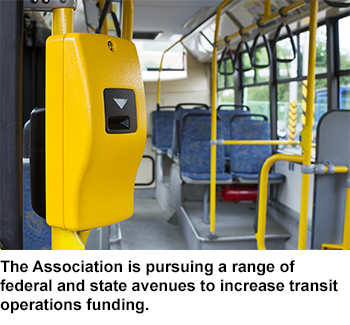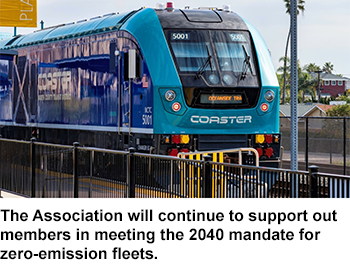By Jacob Herson
Managing Editor
Transit California
In September and October 2022, the Association convened our State and Federal Legislative Committees to establish our legislative and budgetary priorities for the coming year.
“Of course, with the looming fiscal cliff faced by many agencies, and the need to re-grow ridership, transit operations funding is front and center in our legislative priorities for 2023,” said Michael Pimentel, Executive Director of the Association. “We will also be revisiting the subject of Transportation Development Act (TDA) reform, deferred by the pandemic, with the goal of modernizing this body of law to reflect transit agencies’ expanding environmental and social charters.”
Matt Robinson, the Association’s Legislative Advocate said: “The Association’s State Legislative Program focuses on several issues important to transit agencies, including securing new funding to help bring riders back to our systems and maintain safe, reliable, and critical transit service. The Association’s advocacy team will also pursue sponsored legislation related to land-use, fare reimbursements, and electricity prioritization, all of which were ideas generated by our member transit agencies."
“Delivering on the Association’s legislative priorities in 2023 will require an ‘all hands on deck’ approach to advocacy,” said Beverly Greene, Chair of the Association’s State Legislative Committee, and Executive Director of External Affairs, Marketing & Communications at Alameda-Contra Costa Transit District (AC Transit). “To keep California’s transit industry coordinated and marching in the same direction, the Association will create several new subcommittees focused on addressing our highest priorities, including transit operations funding, ridership recovery, and safety. This work will expand on our existing work on zero-emission technologies, DEI, and TDA.”
“In 2023, the Association’s federal advocacy efforts will focus on influencing the funding flow of programs authorized by the Infrastructure Investment and Jobs Act (IIJA) and the Inflation Reduction Act (IRA) to ensure California transit agencies receive their fair share,” said Georgia Gann Dohrmann, Chair of the Association’s Federal Legislative Committee and Assistant Director for Legislation and Public Affairs at the Metropolitan Transportation Commission (MTC) and Association of Bay Area Governments (ABAG).
Transit Funding 
Against the backdrop of a state budget deficit, the Association will advocate at the state-level — as we have historically — for the maintenance of all existing transit funding sources and work to ensure that the additional Transit and Intercity Rail Capital Program (TIRCP) funding identified in SB 198 is appropriated. In these pursuits, the Association will partner with local government, the environmental community, and other interested transportation stakeholders, among others, and form coalitions advocating for protection of transit funding.
The Association will also work to protect the existing long-term Cap-and-Trade revenue allocated to transit in SB 862 through the Low-Carbon Transit Operations Program (LCTOP) (5 percent) and the TIRCP (10 percent) and support continued appropriations of Cap-and-Trade funds to the Low Carbon Transportation program to be used for transit.
With agencies across the state facing a fiscal cliff and undertaking efforts to rebuild their ridership, the Association will seek additional state operations funding. In seeking this operations funding, the Association will explore a range of revenue options to approach the Governor and Legislature with, including raising existing revenue sources (diesel sales tax, transportation impact fee), setting up an emergency one-time escrow account, increasing the amount of Cap-and-Trade funds flowing to transit, and directing revenue from new taxes or funding sources towards transit (oil profits windfall tax). This effort will be steered by a new joint subcommittee of the Association’s Executive Committee and State Legislative Committee.
At the federal level, the Association will continue to monitor the ongoing litigation related to implementation of the Public Employees’ Pension Reform Act (PEPRA) of 2013 and will engage, as appropriate, the Biden Administration and the United States Congress to ensure funding to California transit agencies remains unimpeded.
The Association will continue to support a minimum appropriation level for federal surface transportation programs equal to, at least, authorized spending levels, and advocate for the highest possible levels of funding for individual highway, rail, project finance, innovation, safety, and transit programs.
IIJA created various new funding programs and established new requirements on transit agencies on matters including the transition to zero-emission technologies, Build America/Buy America, and transit safety and security. The Association will continue to monitor and respond to federal rulemakings and notices to ensure that new programs and new requirements are implementable by California’s transit and rail agencies and to ensure that California’s transit and rail agencies are well-positioned to receive discretionary grant awards.
The Association will continue to monitor the disbursement of federal COVID-19 relief funds and engage Congress and the Administration, as necessary, to address any barriers related to access and use of these funds. Additionally, the Association will scope — in concert with our federal partners and in discussion with California’s congressional delegation — the potential for pursuing and securing additional federal relief to address near-term expected operational funding shortfalls.
Zero-Emission Transition
The Association will continue to advocate to ensure funding is approved by the State Legislature for the Clean Truck, Bus, and Off-Road Equipment Program — which includes, but is not limited to the Hybrid and Zero-Emission Truck and Bus Voucher Incentive Project (HVIP) and Clean Off-Road Equipment Voucher Project — and emerging opportunities to support zero-emission transit vehicle deployment and the California Energy Commission’s various clean transportation programs that support zero-emission transit vehicle infrastructure buildout — across modes. 
For HVIP and the California Energy Commission (CEC) Clean Transportation Programs, specifically, the Association will advocate to maintain the funding set-asides approved in the FY 2022-23 budget to specifically and exclusively advantage transit agencies. These efforts will include working to secure the additional ZEV funding identified the Assembly Budget bill AB 211 (2022). Additionally, the Association will continue to engage on HVIP and TIRCP guidelines to better align these programs and their requirements to reflect the needs and limitations of transit agencies and thus increase the share of funding available to transition to zero-emission buses.
Finally, the Association will work with the State Legislative Committee and Executive Committee to review and analyze the potential to develop and pursue a legislatively authorized state funding source to further subsidize the transition to zero-emission vehicles by 2040.
The Association will continue to educate the Legislature, California Air Resources Board (CARB), the Public Utilities Commission (PUC), and the CEC on the real-world costs and experiences of transit agencies deploying zero-emission transit vehicles. More specifically, the Association will continue to work with its ZEV Task Force to identify and pursue legislative, budgetary, and regulatory strategies to reduce the costs associated with deploying ZEVs and complying with the regulations. We began engaging with CARB on the proposed In-Use Locomotive regulations in late 2022 and will be positioned to well represent our rail agency members in 2023 in this regard.
To address the high cost of electricity and hydrogen as a fuel, the Association will continue to work with its ZEV Task Force to monitor the implementation of new commercial electricity vehicle rates, approved by the PUC in 2018 and 2019, and will engage the PUC to ensure that approved rate designs reduce the cost of operating battery-electric buses and are extended, as appropriate. Additionally, the Association will engage with the CEC to develop and implement strategies for reducing the high cost of hydrogen as a fuel.
The Association will also pursue legislation to ensure electricity is prioritized for transit agencies. As public transit agencies statewide replace their vehicles, rolling stock, and vessels with all-electric fleets, the Association has heard concerns from transit agencies about the ability to maintain service during public safety driven power shut offs and rolling blackouts. The Association will engage with the Legislature to identify transit agencies as essential-use customers and to prioritize energy storage for transit agencies so they can continue offering essential services without having to compete for resources.
The Inflation Reduction Act (IRA) created various new funding programs at the U.S. Environmental Protection Agency (USEPA) to support, among other things, the transition to zero-emission vehicles (ZEVs). The Association will respond to federal rulemakings and notices and pursue amendments, as necessary, to ensure that new programs allow transit agencies to apply and benefit California transit projects. As new programs will be overseen by the USEPA, the Association will work to develop new relationships at this federal agency.
TDA Reform
The Association will continue the work of the Transportation Development Act Reform Task Force, which began in response to a legislative request to review and suggest potential reforms to the Transportation Development Act (TDA). In 2018, the Association received a letter jointly authored by Senate Transportation Committee Chair Jim Beall (D-San Jose) and Assembly Transportation Committee Chair Jim Frazier (D-Antioch), requesting the Association to “spearhead a Transportation Development Act Policy Task Force to fully examine performance measures for our state’s public transportation system and produce a legislative recommendation for any reforms or changes to the current programs.”
In response, the Association convened a multi-agency Task Force in early 2019, which began reviewing existing statutes, agency procedures, and metrics used for determining compliance with and fund allocation under TDA law. The Task Force developed a draft proposal and previewed that with Association membership in early 2020. However, the pandemic temporarily put the effort on hold and the Association focused on scoping and securing short-term and long-term statutory relief measures related to TDA and State Transit Assistance revenue-based distributions for transit agencies. These statutory relief measures largely built on the work Task Force’s efforts.
As we enter 2023, the Association, after receiving feedback from the Senate and Assembly Transportation Committees (a process that is now getting underway), will revisit the larger reform effort to determine if there are more holistic reforms to TDA law we must pursue. While those steps are taken, the Association will pursue a short-term extension to the existing statutory relief through Fiscal Year 2024-2025.
Workforce Needs
There has been a dire shortage of transit bus drivers and bus maintenance positions for years, and COVID-19 has exacerbated this problem. In a 2022 survey by the American Public Transit Association (APTA), 71 percent of transit agencies reported that they have either had to cut services or delay service increases because of worker shortages. Nearly all responding agencies indicated that they face challenges hiring new employees.
To address this perennial issue, the Association will advocate for new state resources to fund existing transit workforce development programs or establish new training programs, through pilots or other means, in community colleges to ensure a strong pool of skilled transit workers for the future.
The Association will continue to work with the Department of Motor Vehicles (DMV) and other relevant state entities on driver testing, certification, and licensing, and pursue legislation or new funding, if appropriate, to improve the time it takes to deploy new bus operators. These efforts will be focused, in part, on addressing the challenges related to transit agencies meeting the 10-test rule for the Employer Testing Program to build on efforts begun in 2021.
In 2022, the Association drafted and sent a letter to the DMV offering a series of recommendations to alleviate the shortage in transit operators. These recommendations included expediting commercial licensing and pursuing state funding for additional courses, appointments, and online webinars to allow for recertification of Examiners.
The Association will continue to explore new ideas and support member agencies as they work to improve the enforcement of violations on transit systems or those that may impact transit service. The Association will also support efforts to better protect transit vehicle operators and will develop a subgroup of the State Legislative Committee to work with employee representatives and other stakeholders to determine what, if any, legislative approaches should be considered, including expanding the use of prohibition orders and increasing fines and penalties for certain crimes committed against transit employees.
For more information, you can read the programs on the Association's website here.